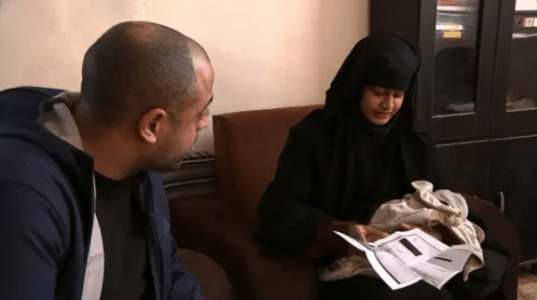
Shamima Begum sells food parcels to pay for western clothes in bid to distance herself from the Islamic State
Shamima Begum is selling food parcels to pay for hair dye and western clothes to distance herself from Islamic State supporters in the detention camp where she is being held, ITV News has been told.
Begum has claimed that she wants to stand out from women who continue to support ISIS and have threatened her since her public rejection of the group in a series of television and newspaper interviews.
Begum has been living in Al-Roj Camp in northeast Syria since her UK citizenship was stripped from her in 2019.
The claims are among new information discovered by ITV News as part of a new podcast series, presented by Global Security Editor Rohit Kachroo, which considers whether public authorities made errors that enabled the 22-year-old to travel to Syria with two other East London schoolgirls when she was 15.
In messages smuggled out of the camp where she is being held and sent to a filmmaker, Begum makes clear her despair at being left ‘stateless’ and describes how she has tried to recover from the trauma of losing three babies, saying “I’ve moved on from that part of my life, it doesn’t make me feel sad anymore.
The series, titled “Shamima Begum: The Blame Game”, charts Begum’s journey into Syria in 2015, and hears from the former head of Scotland Yard’s counter-terror command who led the police investigation into her disappearance.
In his first interview about the case since leaving his post, he rejects allegations that police failures allowed Begum and her friends to make it to Syria.
Richard Walton says he led “a textbook investigation”, and denies that faster action by the Metropolitan Police could have stopped the three schoolgirls from making it into ISIS-controlled territory.
Instead, he claims the girls’ journey to Syria was “exploited by extremist organisations for their own purposes, to try and put the blame for this matter on the police….It was not the police that decided to go to Syria.”The series charts Begum’s escape from ISIS territory alongside other British recruits shortly before the group’s territorial defeat in 2019.
It reveals how she travelled with members of a family from Luton who she befriended as they raced to get out before the collapse of the terror group.
Muhammed Mannan, 75, his wife Minera, 53, their three sons, daughter, daughter-in-law, nephew, niece and three grandchildren travelled to Syria in 2015.
Surviving members of the family became Begum’s travel companions as they attempted to flee together.ITV News has also investigated why a Serious Case Review into the girls’ disappearance has never been undertaken by Tower Hamlets council despite other examples around the country such as the review commissioned by Brighton and Hove council into the case of Abdullah Deghayes, 18 and his brother Jaffar, 17. The pair travelled from the South Coast to Syria in 2014 and were killed in fighting within months of each other.
That review found opportunities had been missed to spot the radicalisation of the teenagers and it has left councillors in East London why a similar approach has not been implemented into the case of Shamima Begum and her two school friends, Kadiza Sultana and Amira Abase.
Puru Mia, councillor for Mile End, believes that the case speaks to a wider culture of neglect by Tower Hamlets council. “These girls have been abandoned by Tower Hamlets, and no one in Whitehall or any regulatory authority has picked it up because they don’t care that an entire population has been abandoned.”
In response, Tower Hamlets council believes there are no grounds for a review saying, “No new evidence has been presented since 2015 and given the length of time that has now passed, it is unlikely that any relevant learning for the current safeguarding partners would be forthcoming, almost seven-years later.”
In February 2019 ITV News broke the story of Shamima Begum having her UK citizenship stripped from her by then Home Secretary Sajid Javid.
Days later, Begum learned her fate in Syria when she was told of the decision by ITV News’ Security Editor Rohit Kachroo who had travelled to Syria to speak to her in the holding camp she had escaped to having made the decision to leave ISIS.
Since then Begum has been pleading with the UK Government to allow her to return to the UK to face trial.
Tens of thousands of foreign men, women and children are still being held in prisons and camps in northeast Syria because the countries they left refuse to take them back.
Hundreds of British citizens, including Begum, were stripped of their citizenship by the government, making prosecutions in the UK impossible.The former head of the United Nations special investigation into ISIS crimes, Karim Kham QC, calls for former ISIS members to be put on trial, like those at Nuremberg for Nazi leaders after World War Two.”The concern is not where. I really don’t care where the trials take place so long as a fair trial is possible. The imperative is fair trials take place because this is not about us, it is about the right of humanity and particularly the right of survivors to have proper investigations and proper accountability.” Khan says.“It’s obvious that it’s absolutely unacceptable and it’s not tenable to have individuals in ‘No man’s land’.
There’s no sieving between those individuals that may be hardened Daesh members who are criminally responsible… and those that may be caught up in the conflict, be they battered wives or abused children.
There needs to be a way of separating those in a way that marries together due process, consideration, the right to not be indefinitely detained, with security issues, and that requires the rule of law…”‘Shamima Begum: The Blame Game’ is available on Apple podcasts, Spotify and other platforms from today.
Source: ITV





